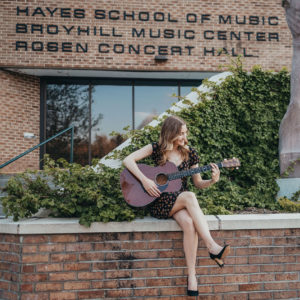Musicians have known for a long, long time what Plato once said – “music is medicine for the soul.” Whether you are a musician or not, most people agree that the right music makes everything better.
That’s probably why neuroscientists have studied music’s effects on the brain and discovered that listening to music heightens positive emotion through the reward centers of our brain, stimulating release of dopamine that can make us feel good, or even elated. Listening to music affects the entire brain.1
Perhaps all of these studies and assertions have led to the growing clinical practice of Music Therapy including the bachelor’s and master’s-level degree programs at Appalachian State University.
According to the American Music Therapy Association, music therapy is the clinical and evidence-based use of music interventions to accomplish goals in therapeutic relationships. Music therapy interventions can address a variety of healthcare and educational goals including: Promote Wellness; Manage Stress; Alleviate Pain; Express Feelings; Enhance Memory; Improve Communication; Promote Physical Rehabilitation; and more.2
Music Therapy is provided by a credentialed professional who has completed an approved music therapy program. Appalachian has had its Music Therapy Program in place for 25 years. And because the 92 students in the undergrad or master’s program are required to complete 1,200 supervised clinical hours, patients of Watauga Medical Center (WMC), Cannon Memorial Hospital (CMH) and Appalachian Regional Behavioral Health Hospital (ARBHH) are benefiting from it.
Dr. Christine Leist, who is a professor of music therapy at Appalachian says the evidence-based practice is proving beneficial for certain populations, including people with Parkinson’s disease, cancer, Alzheimer’s disease, and mental disorders. Other populations served include NICU patients and their families, children and adults with disabilities, and those in neurorehabilitation.
And it’s a fulfilling vocation for the practitioners.
For grad student Joseph Cooper from Raleigh, he finds fulfillment by working with pediatric patients and just received an offer to work at Baystate Health, Pediatric Palliative Care in Springfield, Massachusetts. Cooper also enjoys supporting family interactions.
During one impactful session in the intensive care unit, he was there with a male patient, whose wife was also in the room. Though the patient was sedated at the time, he asked the wife to gather some of his musical preferences. During the second session, Cooper played these selections – some John Denver and “My Girl” and brought back memories and positive recollections. The patient was communicative by nodding and singing. Through music therapy, Cooper helped build the connection between the patient and his wife and helped foster communication.

For Emily Christopher (pictured), helping to ease pain gives her great gratification. Becoming a music therapist has been part of her plan since 8th grade. The Greensboro native undergrad says she will sometimes play repetitive chord progressions on her guitar while guiding patients through scenery and sensory experiences with a therapeutic tone. She says patients often report a significant decrease in their pain level after a session. However, she says patients like all kinds of music.
One ICU patient loved Toby Keith. So grad student Jenna Kyber played Toby Keith and the
the patient’s heart rate improved from 130 to the low 80s.
But there’s much more that goes into a music therapy session than just performing a few tunes.
Just at ARBHH, two music therapy students from Appalachian plan and facilitate an hour of music therapy experiences for each weekly session.
According to Lori Heyward, recreation therapist at ARBHH, “The patients here look forward to the music therapy sessions throughout the school year. Patients participate at all different levels, ranging from sitting and quietly listening to the music being played to fully engaging in a music bingo game, or singing along and/or playing along with a rhythm instrument. Patients are able to relate their feelings to the chosen music, often getting to re-write the words to certain songs to express those feelings.
“Sessions typically end with a few minutes of relaxation – guided imagery, progressive muscle relaxation, breathing exercises – to soft guitar or keyboard music. Although participation is invited and encouraged, patients are able to join in at their own comfort level and pace. Throughout the sessions, patients can be seen smiling, laughing, crying, connecting with each other by finding commonalities, singing, keeping beat with the music, and enjoying themselves. The same song or activity can touch each individual in such a different way. Patients definitely enjoy interacting with the students and the sessions.”
Though no one claims music is a cure, it is a salve.
The High Country is fortunate to have many caring individuals who participate in patient care at Watauga Medical Center, Cannon Memorial Hospital and Appalachian Regional Behavioral Health Hospital. From doctors, nurses, clinicians and care management to family, volunteers, students and many others, patients have a team of support behind them on their health journey.
Feature Images: Macel Reising, a board-certified grad student from Annapolis, Maryland, completed some of her graduate practicum at the ICU at Watauga Medical Center. She enjoys helping patients relax through music and says their reactions are tangible and positive. During sessions with patients, she monitors heart rate and blood pressure and often notices improvements throughout the session.
1-https://greatergood.berkeley.edu/article/item/five_ways_music_can_make_you_healthier
2-https://www.musictherapy.org/about/musictherapy/
Share this page
